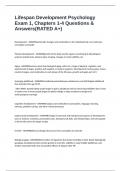Exam (elaborations)
Lifespan Development Psychology Exam 1, Chapters 1-4 Questions & Answers(RATED A+)
- Course
- Institution
Development - ANSWERsystematic changes and continuities in the individual that occur between conception and death Physical development - ANSWERgrowth of the body and its organs, functioning of physiological systems include brain, physical signs of aging, changes in motor abilities, etc Aging ...
[Show more]



